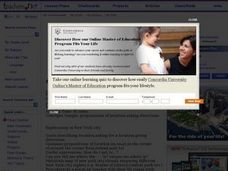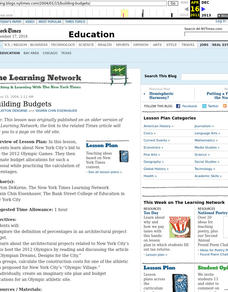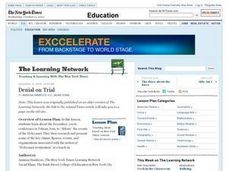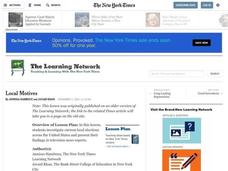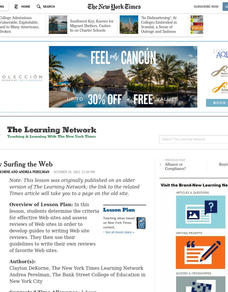Curated OER
The Learning Network: Re-envisioning Classic Stories
Readers reflect on enjoyable stories they know, brainstorm criteria that make a story "good," analyze a New York Times article about innovative children's performances, re-envision classics on their own, and peer edit drafts. Use this as...
Curated OER
Sightseeing in New York City
Students practice locating tourist attractions in New York City, and ask for location and directions in their own hometown.
Curated OER
Playing With Science
Young scientists investigate the scientific concepts and principles that help make common toys such as hula hoops, yo-yos, slinkies, and silly putty work. As a class, they read "Backyard Rocket Science, Served Wet" to get a look behind...
Curated OER
Building Budgets
Students explore New York City's bid to host the 2012 Olympic Games. They estimate budget allocations for such a proposal while practicing the calculation of percentages.
NYC Department of Records
Citizenship and Elections: The Importance of a Ballot
Approximately 58 prcent of those eligible voted in the 2016 US Presidential election. In an attempt to impress upon learners the importance of voting and voting rights, class members examine primary source documents related to...
Curated OER
Green Transportation System
Consider the effects of green transportation. In this environmental stewardship instructional activity, determine how transportation has changed throughout history and then collaborate to solve New York City transportation issues.
Curated OER
Engineer a Solution
Students start by considering the numerous problems facing New York City during the first half of the 19th century, including fire, epidemics, and crime. In addition, they explore how New York's citizens and government tried to solve...
Curated OER
Denial on Trial
What is the "Faurisson Affair”? What is “Holocaust Revisionism”? What does freedom of speech entail? Do revisionists have a right to voice their ideas? Such questions are at the heart of a richly detailed, thought provoking lesson...
Curated OER
Hey, Teacher, Leave My Kids Alone
What are the differences between homeschooling, traditional schooling, and unschooling? Middle and high schoolers examine the opinions of their peers on these varied types of education. After reading a New York Times article, they...
Curated OER
Unforgettable...
Middle and high schoolers remember their most memorable experiences, and then connect their own narrative with an exposition about the topic associated with their experience. This New York Times lesson would be a great addition to...
Curated OER
States and Mates
Discuss and reflect on the concept of allies and alliances. The class examines the competition between the United States and Venezuela. Using the New York Times, they search for examples of geopolitical alliances. In addition, they write...
Curated OER
Bombs Away!
Examine the different perspectives on the future of United States Navy bombing exercises taking place on Vieques, Puerto Rico with this lesson plan from The New York Times. Here, young learners read "Islanders to Vote on Vieques Bomb...
Curated OER
Right to Remain Silent(?)
Learners consider the rights of journalists regarding source confidentiality, then create presentations on the New York Times' use of sources. They write guidelines to aid journalists in evaluating the trustworthiness of their sources.
Curated OER
Art Reflecting Life
Have your young television viewers discuss popular shows among their peers. After choosing one show to analyze, middle and high schoolers read about the 2007-2008 network television lineup with the New York Times article "Gauging...
Curated OER
Who Could Have Been Who
Can word choice affect a candidate's likeability? Use a New York Times lesson to explore how a presidential candidate's likeability factor can fluctuate in public opinion polls. Young readers choose a presidential election from...
Curated OER
E.T., Are You Out There?
Research the necessary components of a planet that supports life after reading the article "All of a Sudden, The Neighborhood Looks a Lot Friendlier" from The New York Times. After finding their information, middle and high schoolers...
Curated OER
A New Era for Palestinians
Get a global perspective and examine the challenges facing Mahmoud Abbas, the newly elected president of the Palestinian Authority. Thoughtful classroom citizens write letters to Mr. Abbas, asking him questions and suggesting advice....
Curated OER
Mayoral Responsibility
Students profile New York City Mayors Rudolph W. Giuliani and Michael Bloomberg and research the actions they took before and after terrorist incidents since 1993. They then write essays about the contribution made by their own mayors.
Curated OER
Fight For Your Rights
Students explore issues related to tenants' rights in New York City, or in the area in which they live. They then create informational pamphlets designed to inform tenants of their rights.
Curated OER
Opinions, Please!
Students discuss the meaning and purposes of polls and surveys. After reading an article, they analyze the results of a poll given to residents of New York City. They create a survey of their own and analyze the data to write a written...
Curated OER
Bridging History and Technology
Students study the history and importance of the Triborough Bridge in New York City, and then research different bridges and prepare presentations about them. They, in groups, research a bridge and prepare a poster about it.
Curated OER
Local Motives
Investigate current local elections across the United States with this New York Times reading lesson plan. Using informational text, middle and high schoolers research local elections and create their own news reports about what...
Curated OER
Strong Convictions
How can the rhetorical structure of an editorial help to develop its argument? Use this New York Times editorial to emphasize the importance of structure in a piece of informational text. Adolescent writers then use the editorial as a...
Curated OER
Critically Surfing the Web
The New York Times article “Online Diary,” launches this study of websites and how to assess them. Richly detailed, the lesson includes warm-up activities, procedures, journal prompts, discussion questions, and links to valuable...



